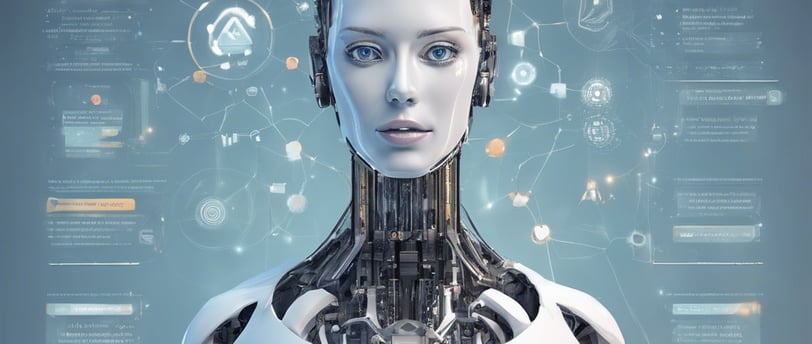The future of AI in the modern world
While AI technologies offer numerous benefits, addressing ethical, legal, and societal implications is crucial to harnessing the full potential of AI in a responsible and sustainable manner.
tecpeopleAI
4/5/20243 min read


Artificial Intelligence (AI) is rapidly transforming various aspects of the modern world, offering unprecedented opportunities and challenges across different sectors. As AI technologies advance, they are poised to revolutionize industries, governance, healthcare, and societal norms. The future of AI holds immense potential for innovation and progress, but it also raises critical ethical, legal, and social considerations that must be carefully addressed.
In the realm of governance, AI is being increasingly integrated into governmental operations, leading to the emergence of concepts like "AI Government 3.0." Countries like the UAE are pioneering the adoption of AI at the governmental level, ushering in a new era of digital governance (Halaweh, 2018). To effectively regulate AI technologies, a collaborative approach blending governmental authority with industry expertise is advocated, emphasizing the need for adaptive and responsive regulations that can evolve alongside technological advancements (Walter, 2024).
In healthcare, AI is reshaping patient care by enabling advanced diagnostics, personalized treatment plans, and operational efficiency improvements (Navath, 2023). The integration of AI and robotics in healthcare is revolutionizing the sector, offering enhanced capabilities for medical professionals and improved patient outcomes (Ness, 2024). Similarly, in the field of neurosurgery, AI shows promise in enhancing care delivery, although challenges related to data quality and accessibility remain to be addressed for widespread adoption (Iqbal et al., 2022).
Moreover, AI's impact extends to areas such as ethics, law, and human rights. The intricate relationship between AI technologies and ethical considerations underscores the necessity for comprehensive, multidisciplinary approaches to address sociopolitical and legal challenges (Wang, 2023). Ethical dilemmas in AI-powered work environments, including privacy concerns, bias risks, and accountability issues, highlight the importance of ensuring human dignity and fairness in AI applications (Oyekunle, 2024).
As AI continues to evolve, its integration into various sectors such as accounting, e-commerce, and marketing is enabling organizations to streamline workflows, enhance productivity, and deliver personalized experiences to consumers (Prasetianingrum, 2024; , Raji, 2024; , Wirtz, 2023). However, the ethical, legal, and social implications of AI deployment must be carefully considered to mitigate potential risks and ensure responsible AI development (Vinuesa et al., 2020; , Carter et al., 2020).
In conclusion, the future of AI in the modern world is characterized by immense potential for innovation and transformation across diverse domains. While AI technologies offer numerous benefits, addressing ethical, legal, and societal implications is crucial to harnessing the full potential of AI in a responsible and sustainable manner.
References: Carter, S., Rogers, W., Win, K., Frazer, H., Richards, B., & Houssami, N. (2020). The ethical, legal and social implications of using artificial intelligence systems in breast cancer care. The Breast, 49, 25-32. https://doi.org/10.1016/j.breast.2019.10.001
Halaweh, M. (2018). Viewpoint: artificial intelligence government (gov. 3.0): the uae leading model. Journal of Artificial Intelligence Research, 62, 269-272. https://doi.org/10.1613/jair.1.11210 Iqbal, J., Jahangir, K., Mashkoor, Y., Sultana, N., Mehmood, D., Ashraf, M., … & Hafeez, M. (2022).
The future of artificial intelligence in neurosurgery: a narrative review. Surgical Neurology International, 13, 536. https://doi.org/10.25259/sni_877_2022
Navath, S. (2023). Transforming healthcare: the impact and future of artificial intelligence in healthcare. JAIM, 1(1), 16-21. https://doi.org/10.55124/jaim.v1i1.234
Ness, S. (2024). Influence of ai: robotics in healthcare. Asian Journal of Research in Computer Science, 17(5), 222-237. https://doi.org/10.9734/ajrcos/2024/v17i5451
Oyekunle, D. (2024). Ethical considerations in ai-powered work environments: a literature review and theoretical framework for ensuring human dignity and fairness. International Journal of Scientific Research and Management, 12(03), 6166-6178. https://doi.org/10.18535/ijsrm/v12i03.em18
Prasetianingrum, S. (2024). The evolution of digital accounting and accounting information systems in the modern business landscape. AAAR, 2(1), 39-53. https://doi.org/10.60079/aaar.v2i1.165 Raji,
M. (2024). E-commerce and consumer behavior: a review of ai-powered personalization and market trends. GSC Advanced Research and Reviews, 18(3), 066-077. https://doi.org/10.30574/gscarr.2024.18.3.0090
Vinuesa, R., Azizpour, H., Leite, I., Balaam, M., Dignum, V., Domisch, S., … & Nerini, F. (2020). The role of artificial intelligence in achieving the sustainable development goals. Nature Communications, 11(1). https://doi.org/10.1038/s41467-019-14108-y
Walter, Y. (2024). Managing the race to the moon: global policy and governance in artificial intelligence regulation—a contemporary overview and an analysis of socioeconomic consequences. Discover Artificial Intelligence, 4(1). https://doi.org/10.1007/s44163-024-00109-4
Wang, J. (2023). The ethics of artificial intelligence: sociopolitical and legal dimensions. ISSLP, 2(2), 27-32. https://doi.org/10.61838/kman.isslp.2.2.6
Wirtz, J. (2023). Corporate digital responsibility (cdr) in the age of ai: implications for interactive marketing. Journal of Research in Interactive Marketing, 18(1), 31-37. https://doi.org/10.1108/jrim-06-2023-0176
HERE TO HELP
We help you understand the complex world of AI and how to implement simple AI processes to improve your business
© 2024. All rights reserved.


